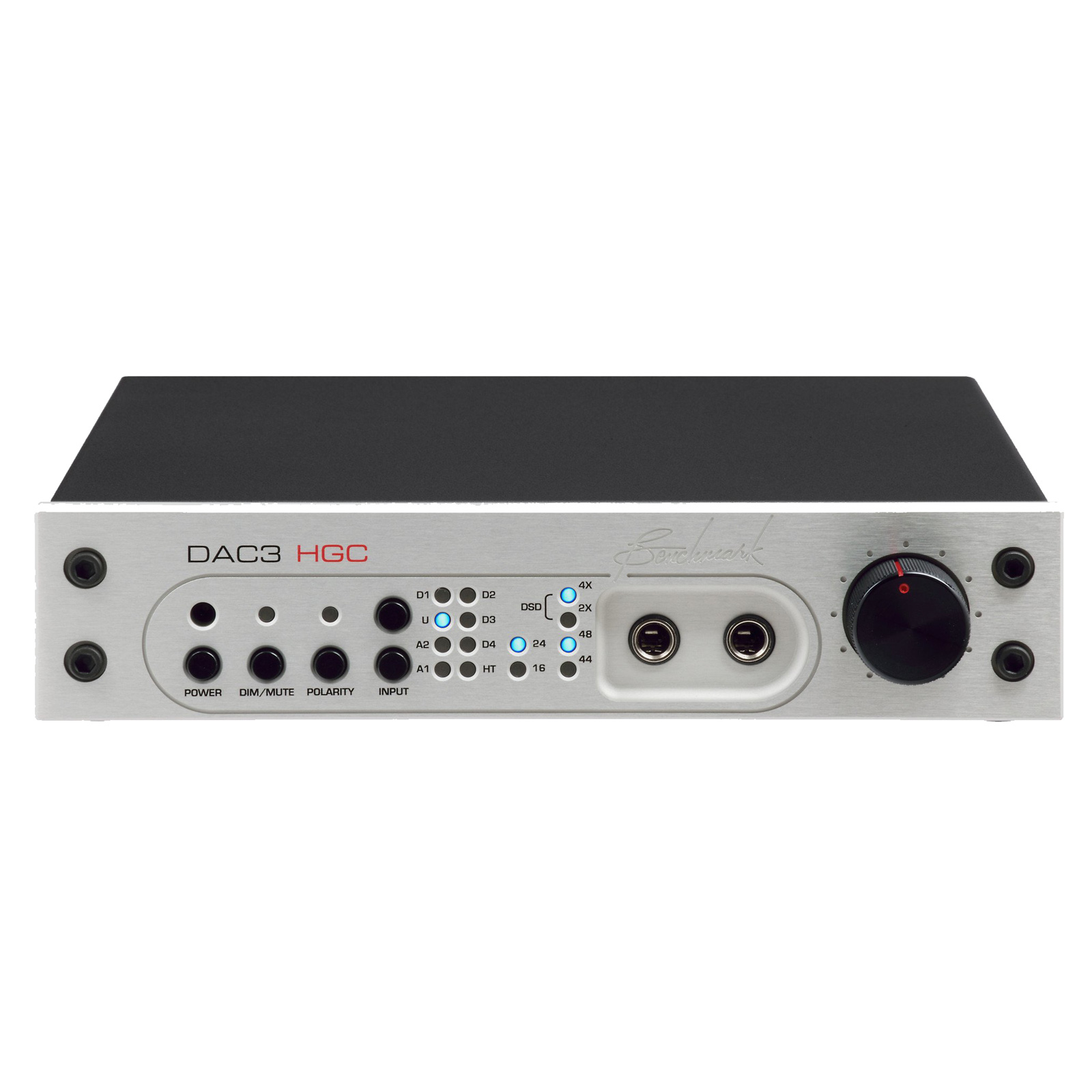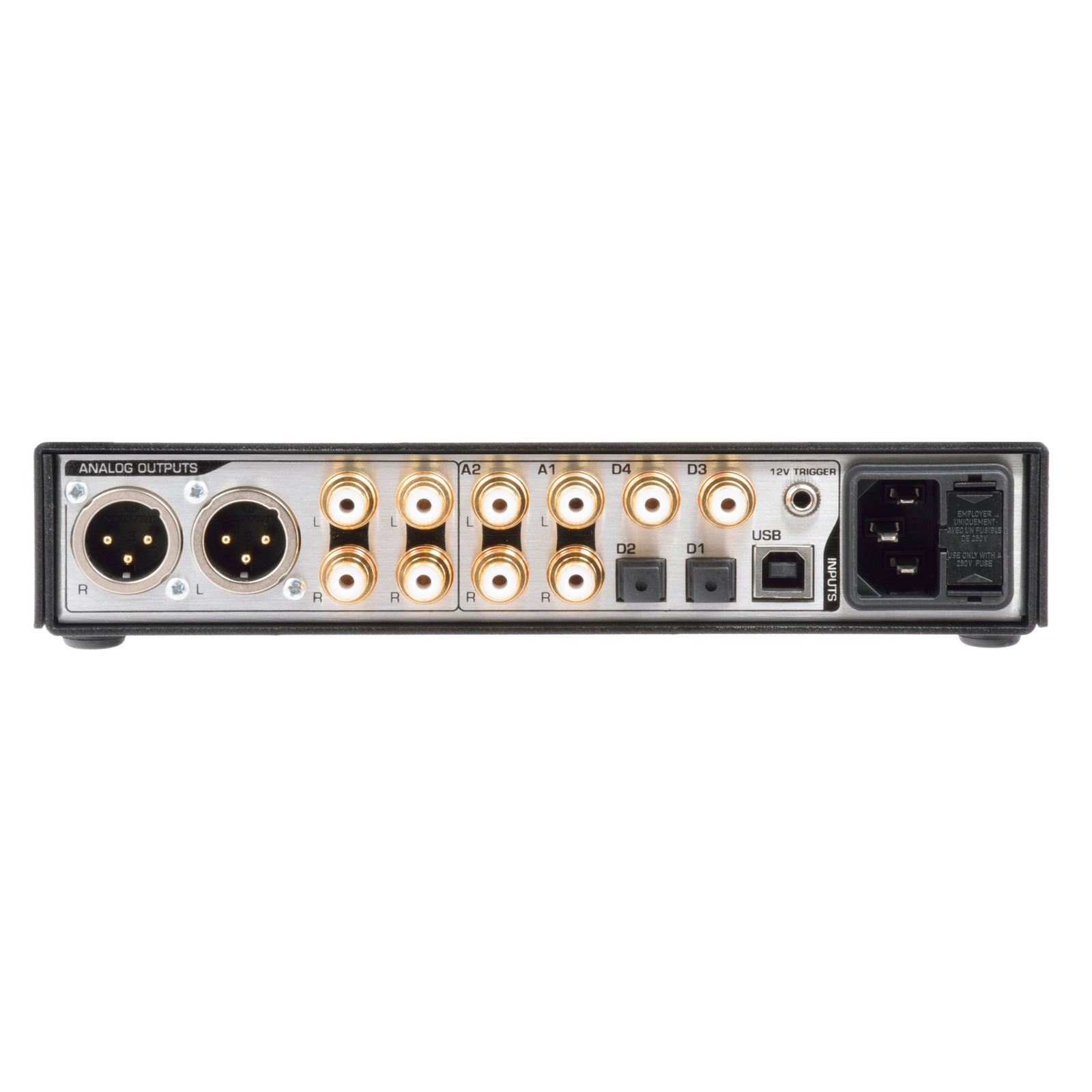A New Reference – Going Beyond the Legendary DAC1 and DAC2
Discover the natural, uncolored, analog sound of the DAC3 HGC. The DAC3 is Benchmark's newest two-channel D/A converter featuring the new ESS Technologies ES9028PRO converter chip. The DAC3 converter has lower THD and THD+N noise than Benchmark's DAC2 converter.
Benchmark's DAC1 and DAC2 D/A converter families have been the reference to which other converters have been compared. It is rare to find a converter review that does not draw comparisons to the DAC1 or the DAC2. Benchmark converters are in daily use at many of the world's finest recording studios and mastering rooms. Benchmark converters are also enjoyed by thousands of audiophiles. Benchmark has raised the bar again. The DAC3 defines a new reference.
Reference Performance
The DAC3 delivers outstanding musical detail and precise stereo imaging. It employs an advanced high-headroom digital filter design and a high-sample-rate Asynchronous USB Audio interface. All inputs are fully isolated from interface jitter by Benchmark's new UltraLock3™ jitter attenuation system.
Four balanced 32-bit D/A converters are summed together to create each balanced analog output. This 4:1 summation provides a 6 dB noise reduction, and gives the DAC3 industry-leading performance.
Internal digital processing and conversion is 32-bits, and this processing includes 3.5 dB of headroom above 0 dBFS. This headroom prevents the DSP overloads that commonly occur in other D/A converters.
DAC3 vs. DAC2
The DAC3 builds upon Benchmark’s highly successful DAC2 product family. The DAC3 maintains the familiar DAC2 form factor and feature set, but DAC3 adds the higher performance available from the new ES9028PRO D/A converter and offers several important improvements over the DAC2.
The DAC3 upgrades include active second harmonic compensation, active third harmonic compensation, along with even lower THD+N and passband ripple. Other improvements are improved frequency response, faster PLL lock times, and faster switching between input signals.
Native DSD Conversion
All digital inputs on the DAC3 support native PCM or DSD conversion. From any input, DSD is transported with bit accuracy over DoP 1.1. DSD and PCM are both natively converted to analog. There are no DSD to PCM or PCM to DSD conversions to compromise the quality of the music. The DAC3 conversion system seamlessly switches between native PCM and native DSD conversion. DSD over DoP 1.1 is supported by many media players, and DSD downloads are now available from several sources.
Direct Connectivity to Power Amplifiers
Benchmark DAC1, DAC2, and DAC3 converters are designed to directly drive power amplifiers and speakers. Benchmark converters feature adjustable low-impedance passive attenuators at the XLR outputs that can be used to optimize the interface to the power amplifier (or powered monitor). This unique Benchmark feature optimizes the gain staging between the DAC and the power amplifier. Proper gain staging cannot be overemphasized. When audio stages are properly matched, each component in the audio chain is able to operate at its optimum signal level, and the system performance is significantly improved.
Sonically-Neutral Studio Monitoring
All Benchmark converters are designed for maximum transparency. This transparency is absolutely essential in the studio monitoring chain. For this reason, DAC3 converters are ideal for critical reference-quality professional systems. Unlike many competing products, the DAC3 is not designed to add "euphonic" coloration to the audio. Instead it is designed to be as uncolored and natural as possible.
Step into the Studio
When Benchmark's professional converters are used in hi-fi applications, studio-quality sound can be enjoyed in a home environment. Enjoy pure music without any coloration from the electronics. Hear the music exactly the way it was heard in the studio, and exactly the way the artists intended.
Sit in the Performance Space
Transparent sound can go beyond replicating the studio experience. Recordings that have been produced with a natural and unprocessed sound can transport you to the performance space. But, this can only happen when the entire playback chain is selected for maximum transparency.
This experience of "being there" cannot be created by systems that are designed to add "warmth" or "euphonic color" to the music.
Harmonic Compensation
The ES9028PRO has two distortion compensation systems that independently remove most of the 2nd and 3rd harmonic distortion in the D/A converter. Benchmark's ultra-clean analog output stages allow these systems to be fully leveraged in the DAC3. To the best of our knowledge, no other D/A converter has lower THD than the Benchmark DAC3.
Hybrid Gain Control
"HGC" is Benchmark's unique Hybrid Gain Control system. The DAC3 combines active analog gain control, passive low-impedance attenuators, a 32-bit digital gain control, and a servo-driven volume control. All inputs are controlled by the rotary volume control. This volume control moves in response to commands from the remote control. Analog inputs are never converted to digital, and digital inputs never pass through an analog potentiometer. Digital inputs are precisely controlled in the 32-bit DSP system. The DSP system preserves precise L/R balance, and precise stereo imaging, while avoiding any source of noise and distortion. Benchmark's unique passive output attenuators provide distortion-free gain reduction without reducing the dynamic range of the converter. The attenuators optimize the gain staging between the DAC3 and the power amplifier. This optimization is absolutely essential for maximizing the dynamic range of the entire playback system. Much of the success of the DAC1 and DAC2 converters can be attributed to the passive output attenuators. Musical details can be obscured by system noise whenever a preamplifier and power amplifier are improperly matched. The" HGC " system will make full use of your power amplifier's dynamic range. Experience new details in your favorite recordings.
Ultralock3™ Jitter Attenuation System
UltraLock3™ is an improved version of the UltraLock2™ system used in the DAC2 product family. UltraLock3™ locks with precise phase accuracy in only 6 ms. In contrast, the UltraLock2™ system required 400 ms. Both UltraLock™ systems provide virtually perfect jitter attenuation, but the the lightning-fast lock time of the new UltraLock3™ will be appreciated by many of our users. DSP processing is 32-bits, DSP headroom is 3.5 dB, sample rate is 211 kHz, and jitter-induced distortion and noise is at least 140 dB below the level of the music - well below the threshold of hearing. Benchmark's UltraLock3™ system eliminates all audible jitter artifacts.
High Headroom DSP
All of the digital processing in the DAC3 is designed to handle signals as high as +3.5 dBFS. Most digital systems clip signals that exceed 0 dBFS. The 0 dBFS limitation seems reasonable, as 0 dBFS is the highest sinusoidal signal level that can be represented in a digital system. However, a detailed investigation of the mathematics of PCM digital systems will reveal that inter-sample peaks may reach levels slightly higher than +3 dBFS while individual samples never exceed 0 dBFS. These inter-sample overs are common in commercial releases, and are of no consequence in a PCM system until they reach an interpolation process. But, for a variety of reasons, virtually all audio D/A converters use an interpolation process. The interpolation process is absolutely necessary to achieve 24-bit state-of-the art conversion performance. Unfortunately, inter-sample overs cause clipping in most interpolators. This clipping produces distortion products that are non-harmonic and non-musical . We believe these broadband distortion products often add a harshness or false high-frequency sparkle to digital reproduction. The DAC3 avoids these problems by maintaining at least 3.5 dB of headroom in the entire conversion system. We believe this added headroom is a groundbreaking improvement.
Multi-Mode Asynchronous USB System
Benchmark's USB system supports USB Audio 2.0, DSD, and USB Audio 1.1. It is frequency agile, and will follow sample rate changes initiated by the computer and/or the media playback software. In all modes the USB communications are asynchronous in order to eliminate unnecessary sources of jitter.
The DAC3 has a low-jitter master clock which controls the transfer of audio data from the computer to the USB sub-system. The computer asynchronously transfers audio data to a buffer in the DAC3. The contents of the buffer are then asynchronously transferred to the D/A conversion subsystem. This second asynchronous transfer eliminates any traces of jitter that accumulate as the data is transferred between the USB and conversion subsystems. No traces of jitter-induced distortion are measurable to our measurement limits (better than -150 dBFS).
This truly represents the state-of-the art. Enjoy the convenience of computer playback without compromise. The Asynchronous USB system supports USB Audio 2.0 for high-resolution 192kHz, and DSD playback. No drivers are required for MAC operating systems. An easy-to-install driver adds 192 kHz and DSD capabilities to Windows operating systems.
An asynchronous, driverless USB Audio 1.1 mode supports sample rates up to 96 kHz. This USB mode can be selected from the front panel or from the remote control. The driverless USB Audio 1.1 mode allows quick plug-and-play connections to Windows, MAC, iOS, and Linux operating systems without installing drivers. Just plug in the USB, and the DAC3 becomes an available audio device.
The USB subsystem remains active when the DAC3 is powered down. This prevents interruptions to the computer playback operations and eliminates the need to reconfigure the computer every time the converter is turned on.
Quad 32-Bit Balanced Conversion System
Four balanced 32-bit D/A converters deliver audio to Benchmark's low-impedance current to voltage converters. The 4:1 redundancy reduces noise and distortion to levels that set new benchmarks. The conversion system at the core of the DAC3 is as good as it gets. The analog circuits that follow the D/A converter are carefully designed. Benchmark has leveraged its long history of building high-end analog audio equipment, in order to create an outstanding output stage.
The conversion system in the DAC3 achieves a 6 dB signal to noise improvement through the use of 4:1 summing. The ES9028PRO D/A is an 8-channel 32-bit converter. In the DAC3, four channels are summed in the analog domain to form each of the two output channels.
The 4:1 summing also improves the THD. The non-linearities in individual conversion channels are averaged across the four summed channels and incoherent non-linearities are attenuated by 6 dB.
Home Theater Bypass
The DAC3 can be integrated into a home theater system. Typically the DAC3 drives the left and right power amplifiers, and an analog feed from the home theater system is connected to either of the analog inputs on the DAC3. A programmable Home Theater Bypass function sets the pass-through gain to unity when the surround system is active. The DAC3 HGC and DAC3 L include an indicator light that is illuminated when bypass is active.
Digital Pass Through
The second coaxial input on the DAC3 can be reconfigured as a digital output. In output mode, any selected digital input (including USB) will pass through to the coaxial output. The digital pass through is bit-transparent and even supports DSD (DoP 1.1). Dolby digital and DTS formats can also be passed through to a surround processor.
HPA2™ Headphone Amplifier
The DAC3 features the HPA2™ - Benchmark's signature high-current, 0-Ohm headphone power amplifier. The HPA2™ is arguably the ultimate reference headphone power amplifier. It will deliver the full rated performance of the DAC3 to the headphones. The DAC3 has two 1/4" headphone jacks on the front panel. The performance of the HPA2™ remains consistent even when two headphones are being driven simultaneously.

























